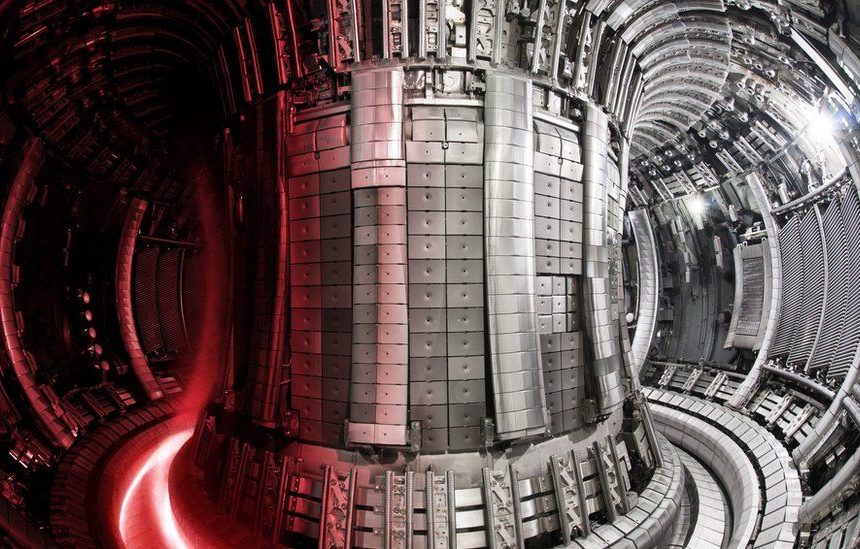The Joint European Torus (JET) laboratory in the UK’s Culham Centre for Fusion Energy have broken records on energy extraction from hydrogen nuclear fusion. Replicating the method of star creation, the JET experiments produced 59 megajoules of energy over five seconds — equalling 11 megawatts of power, enough to boil 60 kettles. This follows government researchers at the Lawrence Livermore National Laboratory in California producing enough energy to power a smoke detector in January. While these developments won’t facilitate a wholesale shift from fossil fuels overnight, can this be the first leap in a bound toward endless low-emission energy production?
Nuclear fusion heats hydrogen gases (deuterium and tritium) at over 100 million degrees Celsius to produce a plasma — the nuclei of which combines to form a helium nucleus and a neutron. The plasmas involved in JET’s tokamak generate hotter temperatures than anywhere else recorded in the Solar System. A fraction of the energy in this reaction becomes fusion energy. These high-speed neutrons are then slowed, and the heat produced will convert water into steam to turn turbines.
>>>READ: Britain Needs New Nuclear to End Reliance on China
Each plasma produces millions of reactions each second, theoretically resulting in abundant energy production from relatively little fuel. Fuel contributes to less than 1% of generation cost. 1 kg (2.2 lbs) of fusion fuel produces 10 million times more energy than that of the same volume of fossil fuels. A 1 Gigawatt fusion power station will need less than one tonne of fuel during a year’s operation. A litre of water contains enough deuterium to provide the energy of <500 litres (132 gallons) of petrol.
The low cost and availability of fusion fuel could also disentangle us from politically precarious supply chains. China manufactures 80 percent of global battery capacity, and its Belt & Road initiative has a monopoly on many mineral deposits. The nation possesses over 29 percent of renewables patents worldwide. Slave labour in the Xinjiang region produces 45% of the world’s solar panels. With readily available alternative fuels, and efficient generation methods, Britain and its allies can have plentiful energy while circumventing morally unpalatable procurement decisions.
There are also little to no concerns about waste. The Department for Business, Energy and Industrial Strategy and the Nuclear Decommissioning Authority estimate nuclear fission will produce 5.1 million tonnes of waste within the next century — 94 percent of which will be Low or Very Low Level Waste, such as clothing worn by engineers. Of the 6% remaining, only 0.1% is High Level Waste, requiring storage in insulated facilities. Options are being explored to recycle the waste. Small modular reactors and salt-thorium (liquid salt) reactors can reuse high yield nuclear waste from fission to produce energy.
>>>READ: A Better Way to Handle Nuclear Waste
Hydrogen nuclear fusion reactors use fuel on the opposite end of the atomic spectrum, so this solution would be inviable for the technology. But the good news is that it isn’t a concern: given the process produces helium as its only by-product. Only decommissioned reactor components, categorised as that 94 percent Low Level Waste, constitutes anything remotely radioactive.
Fusion could be a vital addition to a decarbonised national grid. With renewable technologies still falling short on storage, generation reliability, and grid inertia stability, nuclear is needed to provide a consistent baseload. The abundance of energy prospectively produced by hydrogen nuclear fusion could make the UK a net exporter of energy to other nations playing catchup to our infrastructure. France does this with fission: earning €3 billion annually in exports. The UK government is passing legislation to reduce reliance on loans from China for fission plant construction. Similar market mechanisms could help fund fusion research and adoption in the future, making Britain energy independent and economically prosperous.
These legislative efforts to liberalise funding mechanisms could accelerate the development timeline of projects like the International Thermonuclear Experimental Reactor (ITER). The 35 nation collaboration is set to be operable by 2025, but will be incapable of commercially viable power generation for 20 to 30 years, while technological constraints are overcome. However, as with Britain’s domestic fission reactors, China’s involvement at a time where international relations remain adversarial is a liability for both energy and national security.
Alternatively, the Department of Business, Energy and Industrial Strategy have recently surveyed sites for a prospective prototype fusion energy power plant in Britain. The five shortlisted locations included Ardeer, North Ayrshire; Moorside, Cumbria; Goole, East Yorkshire; West Burton, Nottinghamshire; and Severn Edge, Gloucestershire. The selection process will evaluate the job opportunities in the chosen region. Extending tax incentives to investments in nuclear fusion could enable these exciting experiments to deliver on the government’s “Levelling Up” promise of decentralising prosperity from capital cities.
Government must also assess the role of regulatory bodies. Britain’s descriptive legislation framework makes it easier for engineers to adapt plants to safety specifications. But the parameters of this regulation may require revaluation for this emerging technology. Let’s not let our new nuclear future be hampered by bureaucracy.
Connor Tomlinson is the Head of Research at the British Conservation Alliance, and a political commentator for Young Voices UK. He features regularly in American Spectator, The Federalist, on GB News and talkRadio. Follow him on Twitter: @Con_Tomlinson
The views and opinions expressed are those of the author’s and do not necessarily reflect the official policy or position of C3.
